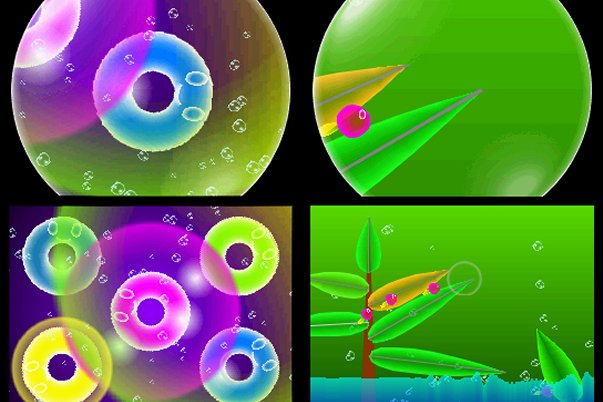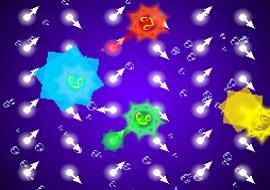GamesRadar+ Verdict
Pros
- +
A collectible oddity with fun ideas
- +
Brief moments of impressive structure
- +
Cool instruction book. Really
Cons
- -
Can't combine plankton to make something large
- -
Even your slickest scores are gone forever
- -
Too expensive for what it can(not) do
Why you can trust GamesRadar+
What happens when Nintendo puts together a completely nutso piece of musical software that's so out of the ordinary it's not even carried on retail store shelves? After playing with a gaggle of fish-like creatures that react in musical ways depending on how you touch them with the stylus, two GamesRadar editors dive into Electroplankton:
Dan Amrich, Working Musician: Electroplankton struck me as the handheld equivalent of a toy xylophone. It's got lots of pretty colors and anybody of any age can walk up, hit it with a mallet and make a noise. But that's not the same as making music, so it's tough for me to call it a "music creation game." More like a "music-themed creative digital interactive funspace."
Brett Elston, Devoted, Tone-Deaf Gamer: Right when you turn it on you're thinking, "Oh cool! Little underwater musicians!" But after spending mere minutes with each of the 10 plankton, I couldn't help but wonder how the next one would sound. Some emulate real instruments while others let you record your voice and screw around with it. A lot of instant gratification but no depth, I felt. The Beatnes plankton were pretty cool, though. Touching segments of their bodies lets out classic sounds from NES games, like the coin twinkle from Super Mario Bros. I heard a few things from Duck Hunt and Kid Icarus, too. You could set a pattern and have it repeat. That probably held my interest the longest.

Dan: Mine too. As a musician, I had the most fun with the two modes that offered pre-recorded backbeats: the fish that acted like a four-track recorder and the Beatnes creatures. But even with Beatnes, I don't think there was a way to keep one pattern going forever; you create a cool pattern on one of the plankton's bodies, and it repeats a few times. Why not let it repeat forever, until I get bored and want to change the beat? The music was constantly evolving, but I wondered why it had to.
Brett:Exactly. I'd randomly make something that sounded cool and look for a way to save it, but couldn't. Imagine my sadness as I stood up and ran around an empty office thinking "Oooh ooh! Someone listen! What? No one?" That moment was lost forever. It does level the playing field with the musically idiotic though. Even if you have no concept of structure, you can manage to squeeze something cool out. Most non-game games at least have something that brings you back repeatedly.This is more like trying to hold together a crumbling sandcastle made of music.
More info
| Genre | Family |
| Description | A $30 seafood-themed xylophone that'll tease your eyes and ears but offer very little in the way of permanence. |
| Platform | "DS" |
| US censor rating | "Everyone" |
| UK censor rating | "" |
| Release date | 1 January 1970 (US), 1 January 1970 (UK) |
A fomer Executive Editor at GamesRadar, Brett also contributed content to many other Future gaming publications including Nintendo Power, PC Gamer and Official Xbox Magazine. Brett has worked at Capcom in several senior roles, is an experienced podcaster, and now works as a Senior Manager of Content Communications at PlayStation SIE.




